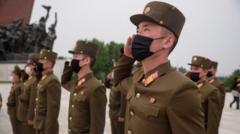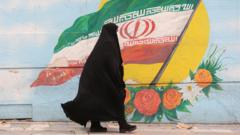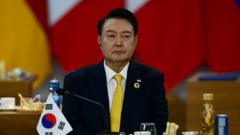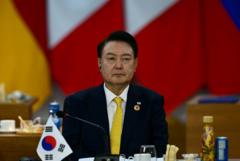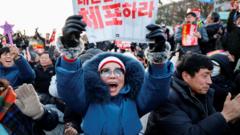Following President Yoon Suk Yeol's unsuccessful attempt to impose martial law, opposition parties in South Korea are moving to impeach him, capitalizing on public outrage. The swift backlash against military rule highlights the growing political divide and raises concerns about the future of democratic governance in the nation.
# South Korea Faces Political Crisis as President Yoon's Martial Law Fails

# South Korea Faces Political Crisis as President Yoon's Martial Law Fails
President Yoon Suk Yeol declares martial law in a bid to resolve political deadlock, prompting widespread backlash and calls for impeachment.
In a dramatic turn of events, South Korea's opposition parties have initiated steps to impeach President Yoon Suk Yeol, reflecting public sentiment following his failed declaration of martial law. This unprecedented move marked a significant backlash against the president, whose attempt to navigate a political stalemate ultimately resulted in chaos reminiscent of the nation’s authoritarian past.
The martial law declaration, issued abruptly on Tuesday night, was the first of its kind in over forty years and was seen as an extreme measure to break a political deadlock. With an assembly dominated by progressive lawmakers and a conservative executive, Yoon's strategy quickly unraveled, lasting only six hours before intense resistance arose within the National Assembly.
Thousands of South Koreans took to the streets, vehemently opposing the president's decision, and Wednesday saw opposition members filing an impeachment motion. Although they hold a substantial majority in the National Assembly, the outcome remains uncertain as they need a two-thirds majority for the impeachment to succeed.
Amidst the turmoil, the president appeared increasingly isolated, with members of his party publicly condemning the declaration. Reports indicated resignations from significant figures within his administration, including the defense minister and his chief of staff, raising questions about the stability of his leadership.
With a vote potentially slated for Friday, the situation underscores the delicate balance of South Korea's democracy, threatening the political future not only for President Yoon but for the broader governance landscape as well. The unfolding drama has reignited fears of a regression into authoritarian practices and has put a spotlight on the importance of political accountability in maintaining democratic values in the country.




